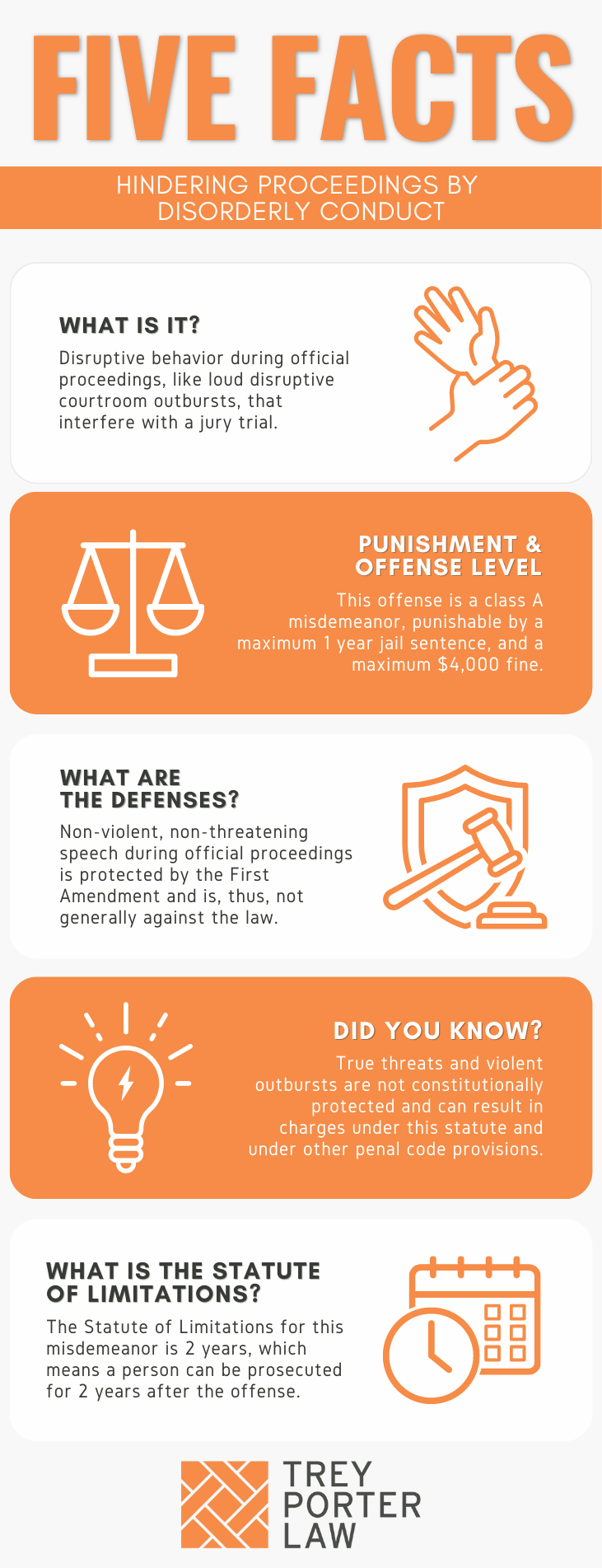WHAT IS HINDERING PROCEEDINGS BY DISORDERLY CONDUCT IN TEXAS?
The Texas law against hindering proceedings by disorderly conduct prohibits disruptive behavior during official proceedings, including violent eruptions in a courtroom.

WHAT IS THE HINDERING PROCEEDINGS BY DISORDERLY CONDUCT LAW IN TEXAS?
Tex. Penal Code § 38.13. HINDERING PROCEEDINGS BY DISORDERLY CONDUCT.
(a) A person commits an offense if he intentionally hinders an official proceeding by noise or violent or tumultuous behavior or disturbance.
(b) A person commits an offense if he recklessly hinders an official proceeding by noise or violent or tumultuous behavior or disturbance and continues after explicit official request to desist.
(c) An offense under this section is a Class A misdemeanor.
WHAT IS THE PENALTY CLASS FOR HINDERING PROCEEDINGS BY DISORDERLY CONDUCT IN TEXAS?
Hindering proceedings by disorderly conduct is a Class A misdemeanor, punishable by up to one year in county jail.
WHAT IS THE PUNISHMENT RANGE FOR HINDERING PROCEEDINGS BY DISORDERLY CONDUCT IN TEXAS?
A person charged with hindering proceedings by disorderly conduct faces up to one year in jail, and a maximum fine of $4,000.
WHAT ARE THE PENALTIES FOR HINDERING PROCEEDINGS BY DISORDERLY CONDUCT IN TEXAS?
As an alternative to jail, a person charged with hindering proceedings by disorderly conduct may be eligible for probation after a conviction, or deferred adjudication without a conviction, for up to two years.
WHAT ARE THE DEFENSES TO HINDERING PROCEEDINGS BY DISORDERLY CONDUCT IN TEXAS?
The First Amendment protects the freedom of speech, so non-violent, non-threatening speech during official proceedings is not generally against the law. A person thus may not be punished criminally for a courtroom eruption, unless it constitutes a threat or other unprotected form of speech. However, one may generally be removed from a proceeding due to disruptive behavior.
- When is speech a constitutionally unprotected threat? States may ban “true threats,” or serious expressions of an intent to commit an unlawful violent act to a particular individual or group of individuals. The speaker need not actually intend to carry out the threat. This prohibition instead protects others from the fear of violence, and disruption that fear engenders. It also protects people from the possibility that the threatened violence will occur. True threats include intimidation where a speaker threatens another with the intent to place the victim in fear of bodily harm or death.
WHAT IS THE STATUTE OF LIMITATIONS FOR HINDERING PROCEEDINGS BY DISORDERLY CONDUCT IN TEXAS?
The limitation period for hindering proceedings by disorderly conduct, a Class A misdemeanor, is two years.
HINDERING PROCEEDINGS BY DISORDERLY CONDUCT IN TEXAS
Disruptive behavior and outbursts during official proceedings, especially if the behavior continues after the person has been asked to stop, may be prosecuted as hindering proceedings by disorderly conduct. Threatening a public servant during an official proceeding may also be prosecuted as hindering proceedings by disorderly conduct, terroristic threat, or even retaliation, depending on the circumstances.
TEXAS HINDERING PROCEEDINGS BY DISORDERLY CONDUCT COURT CASES
The case law regarding hindering proceedings by disorderly conduct illustrates the statute’s application.
- In Walker v. State, the defendant appeared for his court date and he and his attorney approached the judge at the bench. The defendant told the judge he wanted a new attorney, and began to get angry. The bailiffs started escorting him out, and he yelled at the judge, “let’s go [Judge], it’s me and you now.” The judge had to leave the bench to compose herself, and took the defendant’s words as a threat of violence. He was convicted of terroristic threat and hindering proceedings by disorderly conduct, and the appellate court upheld his conviction.
















